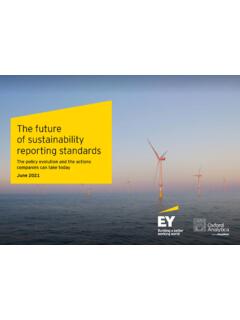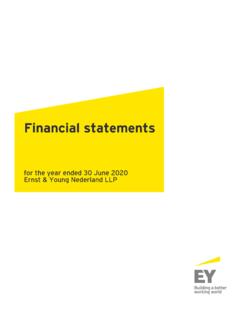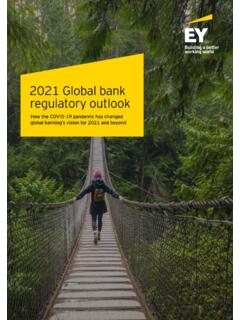Transcription of Ethnic Diversity Enriching Business Leadership - EY
1 Principal SponsorEthnic Diversity Enriching Business Leadership An update report from The Parker ReviewSir John Parker The Parker Review Committee5 February 2020 Members of the Steering CommitteeChair: Sir John Parker GBE, FREng Co-Chair: David Tyler Members: Dr Doyin Atewologun Sanjay Bhandari Helen Mahy CBE Sir Kenneth Olisa OBE Trevor Phillips OBE Tom Shropshire Yvonne Thompson CBE Professor Susan Vinnicombe CBE Matthew Percival Arun Batra OBE Bilal Raja Kirstie WrightObserversSanu de Lima, Itiola Durojaiye, Katie LeinweberDepartment for Business , Energy & Industrial StrategyThanks to our contributors during the year and to this report Oliver CoverAlex DigginsNeil GolborneOrla PettigrewSonam PatelZaheer Ahmad MBER achel SadkaSimon FeekeSimon ManterfieldDr Manjari PrasharDr Fatima TreshLatika ShahContentsForeword by Sir John Parker 2 Foreword by the Secretary of State 6 Message from EY 8 Vision and Mission Statement 10 Current Profile of FTSE 350 Boards 14 FRC/Cranfield Research on Ethnic Diversity Reporting 36 Parker Review Recommendations 58 Company Success Stories 62 Closing Word from Sir Jon Thompson 65 Biographies 66 Appendix The Directors Resource Toolkit 72 Key advisors and contributors to this report:Foreword by Sir John ParkerLast month the United Kingdom embarked on a new journey.
2 Whatever your views about this venture, one thing is unarguable. In a world facing disruption by novel technologies, unprecedented competition internationally, and demographic change at home, we will need to deploy every resource available to us as a nation if we are to sustain the economic prosperity on which our people depend, and which maintains our public services, for example, our schools and the National Health Service. At the heart of our success lies the performance of our many great companies, many of them listed in the FTSE 100 and FTSE 250. There is no doubt that one reason we have been able to punch above our weight as a medium-sized country is the talent and inventiveness of our Business leaders and our skilled people. Many of our leaders have risen from modest backgrounds. Despite the popular image of big Business , I am frequently surprised at the unlikely origins of many Business leaders but I have come to believe that whilst there may not be as many weirdos and misfits amongst us as some would like, a great variety of backgrounds on Boards is itself a commercial plus.
3 I, for one, know that the Boards I have Chaired have benefited from having a variety of voices, backgrounds and experiences represented around the table. But my experience also tells me that in today s world, gender and Ethnic Diversity in our Boards is a competitive advantage. And research report after research report supports this intuition. Add to this that there are now global expectations on Boards not least from our shareholders and many other stakeholders - to demonstrate that our Leadership is responding to and reflecting to their changing customer base. As we pointed out in our first report, 75% of FTSE 100 revenues are earned outside of the UK, in markets which will include the nine countries, that will generate half of the world s population growth between now and 2050 five of which are in Africa and three in Asia. The Business imperatives which we originally set out could not be clearer:1. Greater alignment with our customer base at home and overseas2.
4 Recognising the changes and growing talent pool of ethnically diverse candidates in our home and overseas markets which will influence recruitment patterns for years to comeWhilst we have made great strides in bringing female leaders into the boardroom, almost a majority of the Boards of our FTSE 100 companies remain all-white domains. As one who started life as a student apprentice in shipbuilding myself, one thing is evident to me, this is the moment when industry needs every hand on the deck (as this report lays out). We really should not be leaving so many talented people marooned on the dock side, without the chance to years ago, at the request and with the support of the then Government, we set ourselves a challenge: to ensure that by the end of 2021, no member of the FTSE 100 would lack a person of colour as a director. We also encouraged FTSE 250 companies to meet this target by 2024. With less than two years to go to meet the first of these targets, it might seem that we are way off course.
5 However, our report suggests that whilst we may not yet be up to speed, it could still be possible to complete our journey in start with, we should recall that in the previous and parallel drive to create greater gender Diversity on company Boards, led by Lord Davies, of which I was a Member, it took some time to get the wind in our sails. Yet we hit the target of 25% within the five years we set , we know from work done by the better executive search consultancies that there are many more qualified and competent people from minority backgrounds out there in the UK 32 Ethnic Diversity Enriching Business leadershipand Internationally than we often believe; we just don t meet them and all too often our head-hunters aren t introducing them to , the research conducted for this Review by Cranfield University for the FRC shows that compared to two years ago, many more company Boards are at least talking about their deficit in Leadership , and a significant number have adopted positive policies.
6 Most important a small number have actually gone beyond just talking about it; I am glad to say that 11 FTSE 100 companies which had previously never had a person of colour on their Boards have now made appointments that take them out of the all-white era. And intriguingly, our data shows that women of colour have, if anything slightly outpaced the men though neither group is yet anywhere near being represented on FTSE 100 Boards in the numbers that their talents , I am encouraged that many of my colleagues in the FTSE 100 have also declared an intent to act. Some have done so. But too many of us, I fear, remain complacent that change will come about naturally through the passage of time. Most of us know that this never works in any other aspect of our businesses; and it won t work here. In particular, our survey shows that there are also too few people from Ethnic minority backgrounds being prepared for elevation to Boards.
7 Our pipeline is far from full, and the suspicion is that our company cultures are not actively encouraging talented minority executives and non-executives to choose roles in our businesses when they feel they can leave corporate life and do just as well as entrepreneurs, without some of the want to be honest with my colleagues. I know that, even more than with gender, for every Chairman or CEO reading this report, this feels like dangerous territory. But we need to understand that in today s world, failure to act can be just as damaging to our companies reputations, not to mention weakening shareholder and stakeholder confidence. This is not just a matter of social justice. Many of those who invest in us and trust us as our customers are now monitoring our performance on Leadership Diversity , because they see it as a sign of whether we are truly ready to face up to the challenge of the modern world. To many, our continuing lack of Ethnic Diversity looks less like a failure on the part of minority communities to produce competent candidates, and far more like a choice on the part of Business to settle for the familiar and traditional recruitment processes.
8 But no one doing the same thing, over and over again, brings about a different result. We, as company Chairmen and Chairs of Nominations Committees need to be more assertive not least by refusing to accept the head-hunter s excuse that the candidates just aren t there . For my part, when I hear this message from my consultants, my next step is to find better consultants who can find the talent either at home or in our world of billion am grateful to all those who have helped with this latest survey, in particular the teams at Cranfield and in BEIS who have supported our Steering Committee; and of course, the members of the Steering Committee themselves. Associated with this report is the summary of the National Equality Standard around which our principal sponsor EY has developed frameworks and action plans as part of their work to assist companies create comprehensive Diversity plans, these are worthy of discussion and sincerely believe that, at a time when the UK needs Business to make a crucial contribution, and when public confidence in the market economy is at best fragile, attaining our goal of One by 21 is more than socially desirable.
9 It is an essential element in our country s economic future, and the esteem in which our companies are held around the world. We can and must act without further John Parker GBE, FREng54 Ethnic Diversity Enriching Business leadershipForeword by The Rt Hon Andrea Leadsom MPSecretary of State for Business , Energy & Industrial StrategyI am grateful to Sir John Parker and his Review Committee for their long-standing commitment to improving Ethnic Diversity in UK Business Leadership , and for all their efforts in producing this excellent report alongside EY, Cranfield University, the FRC and my colleagues at m conscious that this is my first foreword for the Parker Review as Secretary of State for BEIS, and I want to lay out my full, unreserved support for the Parker Review s work and ambition. Business in this country simply will not be the best it can be until it better represents the communities it want to make the UK the best place in the world to work and to grow a Business .
10 Workplaces that are fair, inclusive and flexible are not only essential for good working practice - but for success. Research shows that diverse businesses are the highest performing businesses. And at this hugely exciting time in Britain s history, we need to make sure that UK Business are tapping into all the talent and skills available at home and overseas more than ever, driving better company performance and supporting our competitive advantage in the years on from the launch of the Parker Review report and recommendations in 2017, this second report is an important stocktake on the progress Business has made against meeting the Review s key recommendations on increasing the Ethnic Diversity of UK Boards, developing candidates for the Board pipeline, and enhancing transparency and disclosure of company Diversity Review set a target for each FTSE100 Board to have at least one director of colour by 2021 and for each FTSE250 Board to have the same by 2024.










